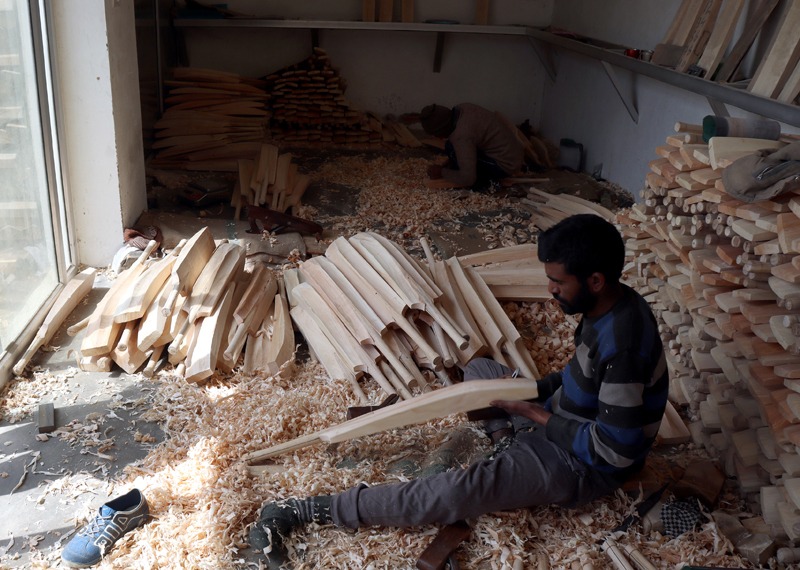
It took 29-year-old Fauzul Kabeer one and a half years of unceasing efforts to finally get his cricket bats made of Kashmiri willow approved by the International Cricket Council (ICC).
The emotional moment of his life came when his Kashmiri willow, similar to the “Salix Alba” wood handmade bat, was used by two Oman cricket players — Naseem Khushi and Bilal Khan — in October 2021 during the T20 World Cup match against Bangladesh at the Dubai cricket stadium.
Kabeer, who did his Masters in Business Administration from Islamic University at Awantipora and is pursuing his Ph.D. in strategic management, fought a battle for over seven years after the death of his father Abdul Kabeer, who set up the GR8 sports manufacturing unit at Sangam in Anantnag.
The young Kabeer wanted to introduce his cricket products including Kashmir willow bats in the international arena.
Recalling the days when the “Made in Kashmir” cricket products were used in Dubai, Kabeer said: “It was an emotional moment not only for me but for the whole of Kashmir.”
He said that to get the products registered by the ICC, “we had to submit all our manufacturing process to meet their conditions”.
Everything about the bat — the size, handle, thickness, width and breadth — had to meet international standards.
“Once you get the approval from ICC, your brand will not be used by anyone in the world and any international player can use our products.”
Kabeer said Naseem Khushi and Bilal Khan of Oman were very happy after playing with the Kashmir-made bat.
“Oman team players not only used our bats but also wore our helmets, glows and pads during the T20 in 2021,” he said. They also placed an order for 60 cricket bats of Kashmiri willow and other items “which we are going to parcel within few days”.
He said that Pakistani cricket bowlers Shadab Khan and Hassan Ali also approached him during the World Cup in Dubai and expressed their desire to use GR8 Kashmir willow bats.
“Players from Bangladesh, Sri Lanka, South Africa, Scotland and Australia have already approached us for bats. We are preparing their orders.”
Kabeer said cricket bats are usually made in only two places — England, Australia and South Africa also make bats but import the wood from England.
He said cricket bats are different for openers, the middle order batsmen and the hard hitters.
Similarly, hard and slower pitches demand different types of bats.
In South Asia, bats are also made in Pakistan using wood from Sialkot, Rawlakote and that part of Kashmir that Pakistan holds, he said. In Kashmir, there are about 400 units making cricket bats.
Manufacturers also sell raw materials to agents in Jalandhar in Punjab and Meerut in Uttar Pradesh who sell the products in their own name.
Kabeer said that after the death of their father, he and his brother Niyaz-ul-Kabeer toured cricket-playing nations including Australia, New Zealand, South Africa and Gulf countries but could not secure orders. “Everywhere they said that Kashmir willow is only for Gully cricket.
” It took seven years for the Kashmiri identity to storm the international market,” Kabeer said.
“Many players have shown their interest and put in their orders.” He said they could not afford Indian cricket players for the promotion as they were seeking crores of rupees.
buy viagra generic viagra4pleasurerx.com over the counter
“We are getting enough orders from Indian states,” he added.
Kabeer’s company has also received a huge order from 150 Dubai schools and cricket academies UNI




